Annex No. 1 Worksheet.
Read the text and complete tasks 26 - 31
A person develops from the first day of his birth. He is looking to the future. He learns, learns to set new tasks for himself, without even realizing it ...
Then he also studies as a boy and a young man.
And the time has come to apply your knowledge, to achieve what you aspired to. Maturity. You have to live in real...
But the acceleration persists, and now, instead of teaching, the time comes for many to master the position in life. The movement goes by inertia. A person is constantly striving towards the future, and the future is no longer in real knowledge, not in mastering skills, but in arranging oneself in an advantageous position ...
In the life of every person there is a curious age-related phenomenon: third-party influences. These third-party influences are usually extremely strong when a boy or girl begins to become adults - at a turning point. Then the force of these influences passes. But young men and women must remember about influences, their "pathology", and sometimes even normality.
Maybe there is no particular pathology here: just a growing person, a boy or a girl, wants to quickly become an adult, independent. But, becoming independent, they seek to free themselves first of all from the influence of their family. Ideas about their “childishness” are associated with their family. The family itself is partly to blame for this, which does not notice that if their “child” has not become an adult, then it wants to be an adult. But the habit of obeying has not yet passed, and now he "obeys" the one who recognized him as an adult - sometimes a person who himself has not yet become an adult and is truly independent.
Influences are good and bad. Remember this. But bad influences should be feared. Because a person with a will does not give in to bad influence, he chooses his own path. A weak-willed person succumbs to bad influences. Be afraid of unconscious influences: especially if you still don’t know how to accurately, clearly distinguish good from bad ...
(D.S. Likhachev)
26. Plan the text. To do this, highlight the main semantic fragments of the text and title each of them.
1. ___________________________________________________________________________________
2. ___________________________________________________________________________________
3.___________________________________________________________________________________
4.___________________________________________________________________________________
…___________________________________________________________________________________
1)________________________________________________________________________________________________________________________________________________________________________
2)_______________________________________________________________________________________________________________________________________________________________________
28. Suggest why, according to the author, third-party influences on a person are especially strong in turning points his life. Using text and personal social experience make two hypotheses.
29. Using facts public life and own life experience, illustrate with three examples the author’s idea that a person is “directed to the future”.
2)__________________________________________________________________________________________________________________________________________________________________________________________________________________________________________________________________________________________________________________________________________________
3)__________________________________________________________________________________________________________________________________________________________________________________________________________________________________________________________________________________________________________________________________________________
30. Using your own life experience, formulate three tips for your peers on how not to succumb to bad third-party influences.
1)_____________________________________________________________________________________________________________________________________________________________________________________________________________________________________________________________
2)_____________________________________________________________________________________________________________________________________________________________________________________________________________________________________________________________
3)_____________________________________________________________________________________________________________________________________________________________________________________________________________________________________________________________
31. Using social science knowledge and your own life experiences, give two explanations for why a person cannot completely free himself from the influence of his family.
1)__________________________________________________________________________________________________________________________________________________________________________________________________________________________________________________________________________________________________________________________________________________
2)_________________________________________________________________________________________________________________________________________________________________________________________________________________________________________________________________________________________________________________________________________________
MEMO FOR PLANNING THE TEXT.
1. Read the text carefully, understanding its content, and identify main ideas.
2. Remember!!! Names of plan items should not fully reproduce individual phrases of the text, as it is required to briefly formulate the main idea of each fragment on your own.
3. The number of selected fragments can be different. 4. In the fragmentation of the text into semantic fragments, there must be a certain logics – based on its understanding, the expert concludes that the main semantic fragments are highlighted.
Requirements for completing assignments in text No. 29:
1) the accuracy and correctness of the given facts (social facts or models social situations), their compliance with the theoretical provisions given in the task.
2) the presence of reasoning that concretizes the essence of what is given in the task theoretical position, logical and meaningful correctness of these reasonings.
3) correctness of reflection in reasoning and facts of connections of various types
The workshop on social studies is focused on preparing students in grade 9 for successful delivery Main state exam in social science. The manual contains an analysis of all types of exam tasks, tasks with detailed recommendations for their implementation for practicing each type of tasks, answers and evaluation criteria. The book is intended for teachers, parents, tutors, as well as students of grade 9 high school for self-preparation for the OGE. Order No. 699 of the Ministry of Education and Science Russian Federation study guides Exam publishing houses are approved for use in educational institutions.
Examples.
The above list lists the similarities and differences between the concepts of "society" and "nature". Select and write in the first column of the table sequence numbers features of similarity, and in the second column - serial numbers of features of difference.
1) in broad sense this is the whole material world
2) these are the natural conditions of human habitation
3) it is the human environment
4) is the totality of all people
Performing tasks of this type, first of all, it is necessary to clarify the main features of both concepts mentioned in it. AT this case these are the concepts of "society" and "nature". Society is a part isolated from nature material world. Nature is the whole world around a person, natural and geographical habitat. There are similarities in these definitions: both are human environment environment and at the same time part of the material world. Therefore, you can indicate answers 1 and 3 in the column "Resemblances". Of the two remaining characteristics, answer 2 refers to the concept of "nature", and answer 4 to the concept of "society". Therefore, these responses can be classified in the "Features of Differences" column. The finished answer will look like a sequence of numbers 1324 without spaces and punctuation marks.
The following list shows the similarities and differences between simple and complex types society. Select and write down in the first column of the table the serial numbers of the similarities, and in the second column - the serial numbers of the differences.
1) part of the material world, isolated from nature
2) there is no state apparatus
3) there is no social stratification
4) stage in historical development specific people.
Free download e-book in a convenient format and read:
- OGE, Social studies, 40 options for typical test tasks, Lazebnikova A.Yu., Kalacheva E.N., 2017
- OGE, Social studies, Highest score, Self-preparation for the OGE, Kalacheva E.N., 2017
- OGE (GIA-9) 2015, social studies, 25 variants of standard test tasks and additional tasks of part 3 (C), Lazebnikova A.Yu., Kalacheva E.N., 2015
The second part examination work is an internally integral section - all six tasks are directly related to the text selected according to certain criteria - the source social information.
Each assignment to the text performs certain function, allowing you to check the qualitative mastery of the content of the social science course and the formation of complex intellectual skills: understand the text as a whole, highlight its main ideas; search for social information and its interpretation, etc.
Among the tasks with a detailed answer, there are tasks of basic (27), advanced (26, 28 and 30) and high (29 and 31) difficulty levels.
Features of the tasks of the second part
According to the type of assessment criteria used, all tasks with a detailed answer can be grouped as follows:
- tasks that have universal, generalized evaluation criteria that do not depend on the specific content of a particular text source (26, 30 and 31);
- tasks with original evaluation criteria (27-29).
So, in any version of KIM, task 26, which involves drawing up a text plan, will be evaluated according to common criteria, reflecting the completeness, clarity, logical sequence of the presentation of the content in the paragraphs of the plan.
At the same time, tasks 27 and 28, related to the extraction and interpretation of the information contained in the text, differ in their structure in the proposed options, and each of them has its own evaluation criteria.
There are also tasks with uniquely defined elements of the correct answer and tasks involving wide range answer options.
Tasks with uniquely defined elements of the correct answer.
The system for assessing the performance of tasks with uniquely defined elements of the correct answer contains a standard of the correct answer and is based on strict consideration of the elements contained in it. The criteria guide the expert to search in the work of the examinee for the elements of the answer given in the standard. Such tasks are usually associated with extracting information from a text fragment. The required units of information are directly determined by the content of the text.
Questions with a wide range of response options.
The criteria for evaluating such tasks differ from the criteria of the previous group. As a standard, an approximate, incomplete number of correct answer elements is given. As a rule, these are examples of completing a task or possible approaches to its implementation - a kind of "key" to assessing the answer of the examinee. They serve as a guide only for the expert. right direction"deployment" of thought in the answer, while the wording of the examinee may be different than those given in the criteria.
The task of the experts is to, using the proposed key-criterion, determine the correctness of these formulations, their compliance with the question posed. This group includes, for example, assignments for the use of contextual assignments (29), where it is impossible to foresee all the likely examples of social objects that graduates can give.
The maximum score for completing tasks 26-28, 30 and 31 is 2 points. In case of incomplete correct answer, 1 point is given. For the complete and correct completion of task 29, 3 points are awarded. In case of an incomplete correct answer, depending on the presentation and / or quality of the required components of the answer, the score will be 2 or 1 point. Wrong answer containing reasoning general that do not meet the requirements of the task - 0 points. Thus, for completing tasks for a text fragment (correct and complete wording of answers for all six tasks), the examinee can get 13 points.
Each of the six questions (tasks) to the document has its own purpose in the examination paper and checks certain group skills.
Consider an example of a text with tasks.
A child is born not with ready-made abilities, but with inclinations, i.e. such features of the structure of the brain and sensory organs, which act as natural prerequisites for the development of abilities. The makings are multivalued, i.e. on the basis of the same inclinations, different abilities may arise depending on the requirements of the corresponding activity. So, acute observation and good visual memory can enter the structure of the abilities of an artist, investigator, geologist.
Whether the inclinations develop into abilities depends not only on the individual characteristics of the individual, but also on historical conditions, on the needs of society. These or other abilities develop when there is a social need for them.
Consider from this point of view such an imaginary situation. Somewhere on a distant island in the Pacific Ocean, a boy with outstanding musical inclinations was born. What can he become, considering that the people of his tribe do not know any other music than monophonic singing, and no other musical instrument except the drum? At best, this boy will go down in the history of the island as the most wonderful drummer. In other words, he will reach such a level of development of his musical talent that is possible under certain social conditions. His fate would have been completely different if he had ended up in a country with a highly developed musical culture and got there with good teachers.
26. Plan the text. To do this, highlight the main semantic fragments of the text and title each of them.
Task 26 requires you to draw up a plan for the text, highlighting its main relatively complete semantic fragments and heading each of them. This task is mandatory in the logic of organizing work with the text: first you need to understand the meaning of the text as a whole, identify the most significant ideas in terms of content and present the structure of the text, and then extract information on individual aspects, analyze specific ideas of the text.
Such a beginning of completing assignments to the text helps the graduate to successfully cope with other tasks of the block, providing a holistic and at the same time differentiated-fragmentary perception of the text fragment. Recall that the plan is understood as a clear sequential presentation of fragments of the content of the text in brief formulations that reflect the topic and / or the main idea of the corresponding fragment.
To complete this task, you must carefully read the text, understand its content, understand the topic, identify the main ideas of the text. It is important to bear in mind that the names of the points of the plan should not fully reproduce individual phrases of the text - the main idea of each fragment should be briefly formulated by the examinee after reading and summarizing the content of the corresponding section of the text. At the same time, the number of selected fragments can be different - the grading system does not set any specific number of plan items, although the approximate content of the correct answer presents the optimal, from the point of view of the developers, version of the plan.
The plan can be simple, that is, including the names meaningful parts text, or complex, including, along with the names of significant parts of the text, the names of their semantic components. In any case, there must be a certain logic in splitting the text into semantic fragments - it is on the basis of its understanding that the expert checking the work can conclude whether the main semantic fragments of the text are highlighted or not. In our example, the following semantic fragments can be distinguished, for example:
- The innate inclinations of a person
- Conditions for the development of abilities.
This plan is in title form. The plan can be drawn up not only in the nominal, but also in the interrogative or thesis form.
The question plan is written in the form of questions to the text; each informative center of the text corresponds to one question. For example:
- What features does the child have from birth?
- What determines the success of the development of the child's inclinations in the ability?
Other formulations of the points of the plan are possible that do not distort the essence of the main idea of the fragment, and the allocation of additional semantic blocks.
The correctness of all formulations of the work in the verification process is determined by the expert.
This task belongs to a group of tasks with universal, generalized evaluation criteria that do not depend on the content of a particular text.
Performance evaluation expert given task basically solves two questions:
- Is the structure of the text correctly grasped by the graduate (are all the semantic parts of the text highlighted; are there any extra ones that are missing in the text? semantic parts; are the points of the plan related in meaning);
- How accurately do the titles of the paragraphs of the plan convey the content of the text (how accurately do the paragraphs of the plan reveal the main idea of the corresponding fragment, the author’s thought; do they correspond common logic disclosing the content of the text).
27. How does the author define the natural inclinations of a person? Give two examples of natural inclinations.
In the correct answer, it should be noted that “natural inclinations” are structural features of the brain and sensory organs that act as natural prerequisites for the development of abilities.
Named as an example: flexibility of the body, good hearing.
Task 27 may contain the following requirements:
- Find any 2-3 definitions in the text (explanations, reasons, characteristics, etc.);
- Find answers to 2-3 questions in the text;
- Find evidence in the text (arguments, etc.) that the author cites in support of some idea;
Often, experts and graduates have a question: why, in cases where it is required to isolate three or more pieces of information from the text, the graduate's answer, containing only one piece of information, is rated at 0 points (after all, is it partially correct?).
In this case, the level of formation of the ability to extract information from the text is checked and evaluated. Bringing one position instead of the required three or four indicates an insufficient level of proficiency in this skill and is assessed accordingly.
28. What three conditions does the author single out as necessary for the development of inclinations in ability?
The answer should list:
- Individual personality traits;
- Favorable environment;
- The needs of society.
Task 28 involves transformative reproduction or some interpretation of the information contained in the text. This type of tasks has several modifications of requirements related to text analysis:
- Determine what is a fact, determine its causes;
- Establish the consequences of the described social phenomenon;
- Explain the position (opinion, point of view, etc.) of the author and give his arguments (explanations, evidence, examples, etc.); evaluate the role of certain factors, etc.
Tasks 27 and 28 are tasks with uniquely defined elements of the correct answer and evaluation criteria. Since they are addressed only to the text, aimed at checking the understanding of certain provisions of the text, the ability to identify the information contained in the text on a given problem, the system for evaluating answers to these questions is based on the standard of the correct answer. Criteria guide the expert to search in the answer of the examiner for the positions named in the sample.
In the graduate's answer, the required information can be given in the form of a direct quotation from the text, and lengths and details can be omitted and only a recognizable fragment of the phrase is given. Information can also be given in the form of a paraphrase close to the text. Both of these options are equivalent.
When evaluating the answer, the expert takes into account that tasks 27 and 28 are directly related to the text, so even the most interesting and logical coherent reasoning of the examinee, not directly related to the content of the text, cannot be considered the correct answer. If the answer is reduced to such reasoning, it is estimated at 0 points.
29. The author notes that on the basis of the same inclinations, different abilities may arise depending on the requirements of the relevant activity. How does he illustrate this conclusion? Give your own example to support this statement.
The response should include the following author's example: development musical ability boy, depending on his place of residence - on the island in pacific ocean or in a highly developed country musical culture and under the guidance of good teachers.
Can be brought own example: good natural plasticity is important for both the athlete and the actor.
So, task 29 involves going beyond the content of the text and involving the contextual knowledge of the social science course, the facts of social life or the graduate's personal social experience. In the above example, the following explanations can be given:
- The development of a person's personality is possible only in communication and interaction with other people (in the process of socialization);
- A person can show his personal qualities only in communication and interaction with other people;
- A person can realize many of his needs only in the process of social life.
Other correct explanations can be given.
This type of tasks has several modifications of conditions and requirements. Here are the most common expressions.
- Using the facts of public life and personal social experience, name 2-3 manifestations of a phenomenon
- using the content of the text, knowledge of the course and personal social experience, give 2-3 confirmations (give 2-3 explanations)
- using the facts of public life and personal experience, confirm with 2-3 examples
- based on social science knowledge and personal social experience, make 2-3 assumptions
- using the content of the text, social science knowledge and facts of public life, give 2-3 examples and briefly explain each example
- using the content of the text, social science knowledge and personal social experience, explain 2-3 situations
- illustrate the idea of the text with 2-3 examples ( concrete examples illustrate any 2-3 characteristics given in the text
The following requirements apply for such assignments:
- Accuracy and correctness of the given facts (social facts or models of social situations), their compliance with the theoretical provisions given in the assignment);
- The presence of reasoning that concretizes the essence of the theoretical position given in the task, the logical and meaningful correctness of these reasoning;
The provisions or concepts that need to be specified, as a rule, are general, sometimes extremely abstract character(such is the specificity of social science knowledge). Examples can be facts of the past and present, gleaned from own experience or publicly known; real events and simulated situations. Answers are allowed varying degrees concretization, and in this regard, some examinees can follow the path of ever greater clarification of the very starting position, highlighting its sides, aspects, forms of manifestation, etc .; others may prefer individual facts that embody the features (characteristics) of the general.
30. Andrei F., four years old, has a good musical memory and is able to accurately reproduce a complex polyphonic melody after one listening. Name three areas of activity in which he can reach the maximum disclosure of his abilities. Point out any social condition that will help him develop his inclinations.
- Three areas of activity are indicated: playing musical instruments and creating music; dance activities, learning foreign languages;
- The condition for the development of inclinations in the ability is indicated: the ability to organize the boy's music, dance or language learning.
Task 30 tests the ability to apply knowledge gleaned from a source of social information to solve a specific problem. In fact, this task involves transferring the information contained in the text to a completely different context, using it to comprehend and explain actual facts and processes real life, practical life situations.
As you can see, tasks 30 used in the examination paper can have two levels of requirements: the first requirement refers directly to the situation formulated in the condition; the second - focuses on the search for information to solve the problem in the proposed source with the involvement of social science knowledge. AT exam options are used different models terms: problem situation, social fact, statistical data, problem statement, etc.
31. "Nature makes a man brilliant, and society makes him great." Do you agree with this statement? Justify your opinion.
The correct answer must contain the following elements:
- The student's opinion is expressed: one or another point of view is chosen;
- Two arguments are given, for example:
- in case of agreement with this statement, it can be indicated that for the development of a person’s natural inclinations, it is necessary not only his desire to develop them, but the ability to do this and the existence of a society’s need for its development;
- in case of disagreement, it may be indicated that natural abilities man will develop in any case, even contrary to the existing social conditions.
Other arguments (explanations) and examples may be given.
Task 31 involves the formulation and argumentation by the graduate of his own judgment (or the author's position, opinion, etc.) on the current problematic issue public life. This task is directly related to the content of the text, but involves considering its individual provisions from a different perspective.
The task is constructed in such a way that in his answer the student can both agree with the given point of view and refute it. The object of evaluation here is the content completeness, logical validity own position student, the variety of arguments given by him (drawn from the course, from media reports, from personal social experience).
This type of tasks has another model of the condition and the requirements arising from it:
- based on the text and social science knowledge, give two arguments (explanations) in defense of the position (opinion, point of view, etc.) of the author ( personal opinion(attitude to the problem).
When checking task 31, experts pay attention to the indicated sources of information for formulating judgments, involving additional information(the social science course, knowledge of other academic disciplines, facts of social life, personal social experience); the required element-wise composition of the response.
Please note: The Ministry of Education and Science recommends in 2017/2018 academic year include educational events dedicated to the year of ecology in the programs of upbringing and socialization(2017 is declared the year of ecology and specially protected natural areas In Russian federation).
We recommend that teachers of grades 1-11 and educators of preschool educational institutions, together with the children, take part in international competition "I love nature" dedicated to the year of ecology. Participants of the competition will test their knowledge of the rules of behavior in nature, learn Interesting Facts about animals and plants listed in the Red Book of Russia. All students will be rewarded with colorful award materials, and teachers will receive free certificates on the preparation of participants and prize-winners of the international competition.
Presentation on social studies on the topic "Preparation for the OGE. Solving tasks 26-31 (Part 2)" (Grade 9)
Library
materials
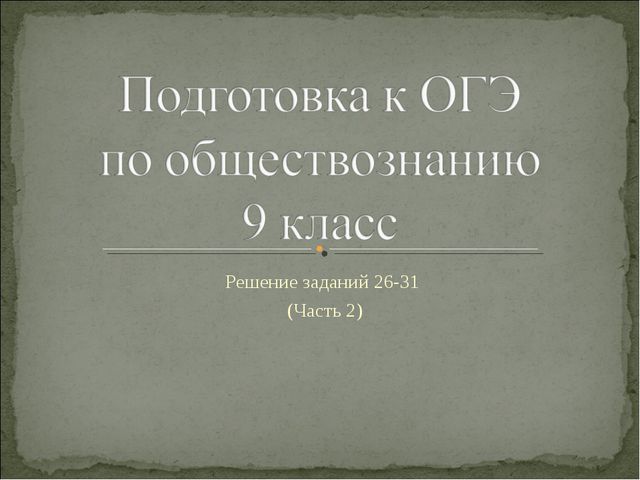
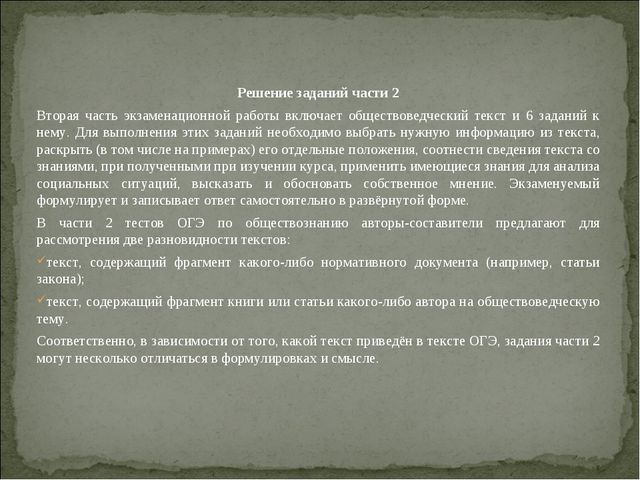

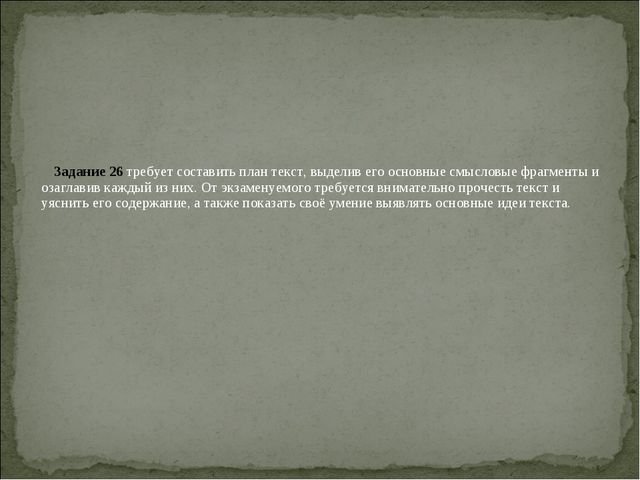
![]()
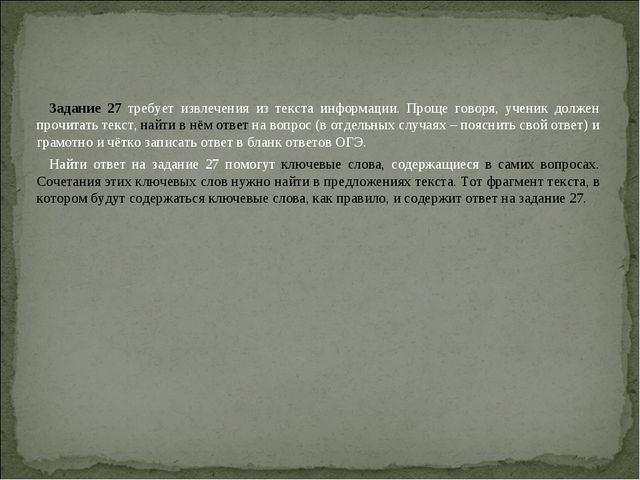

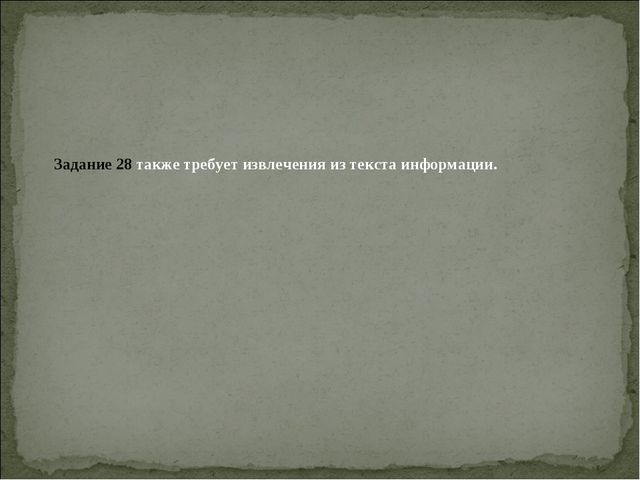
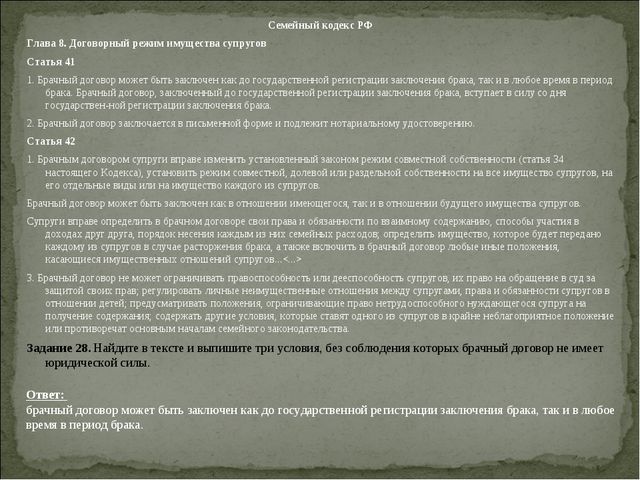
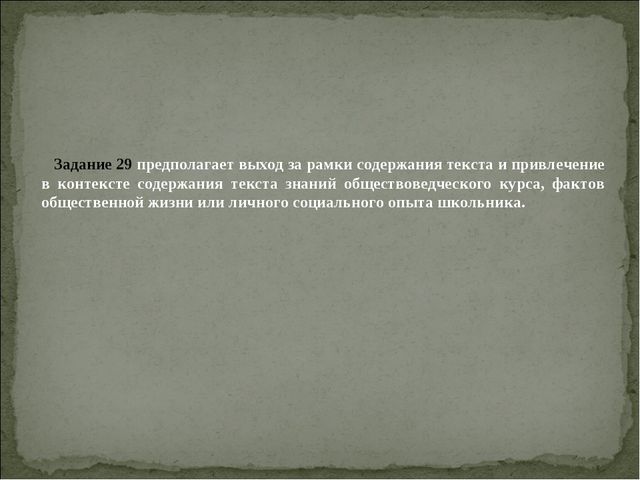
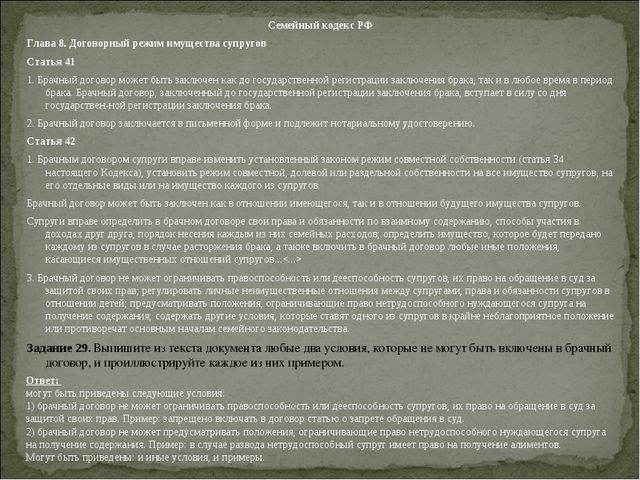
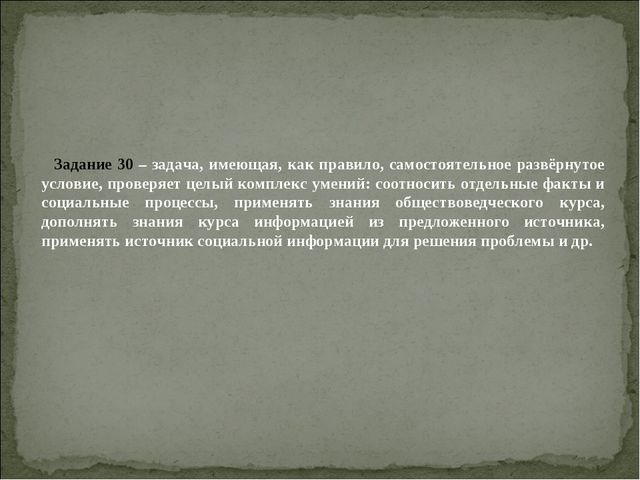

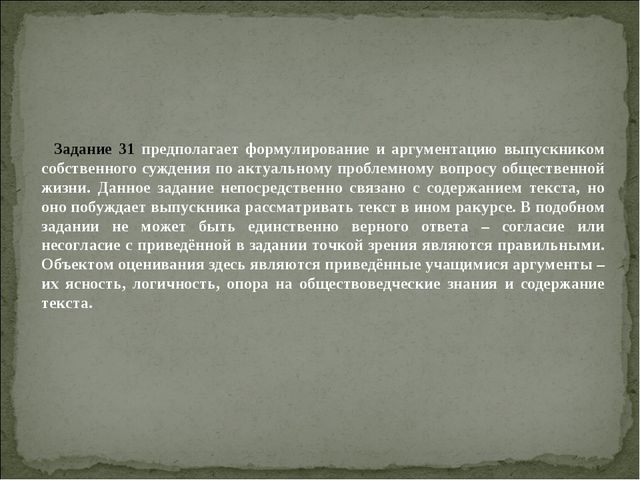
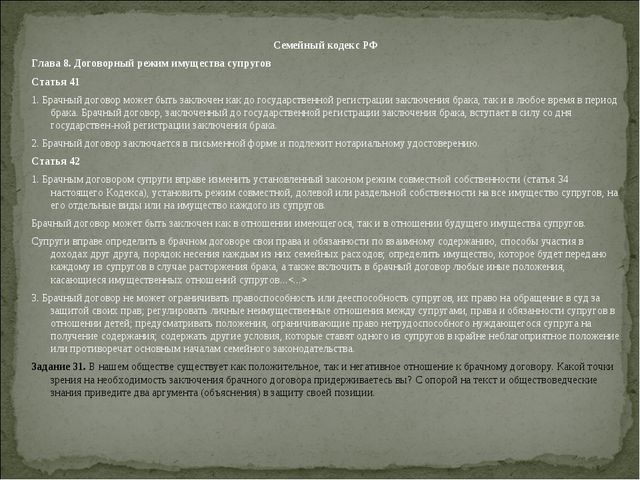
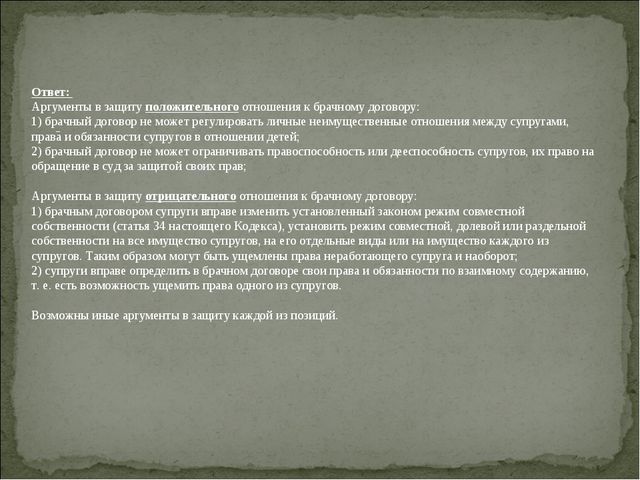

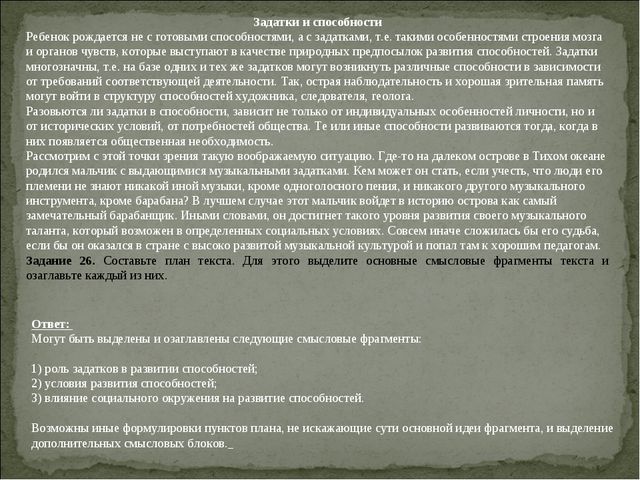
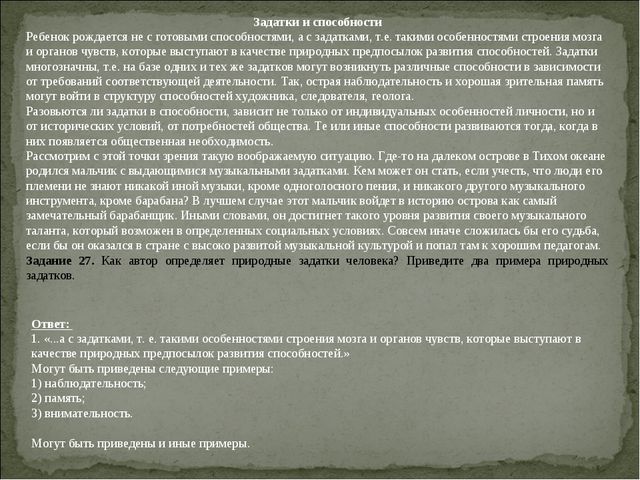
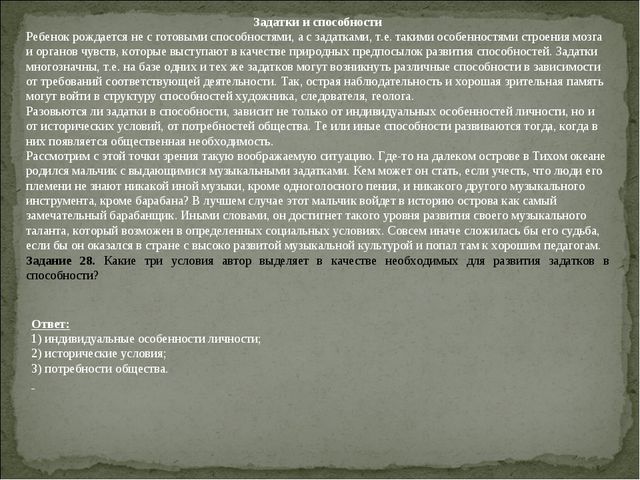
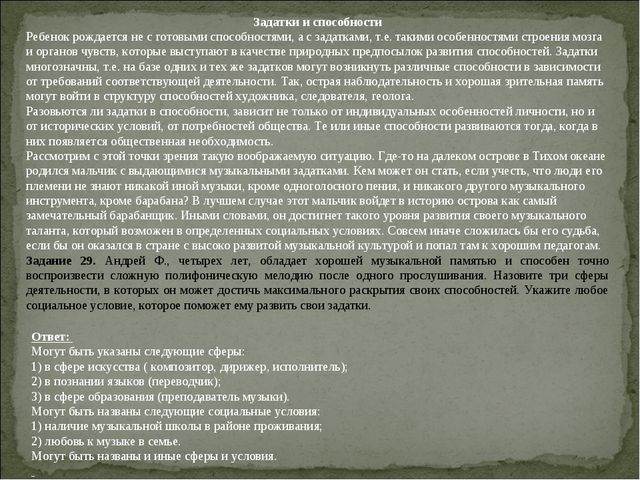
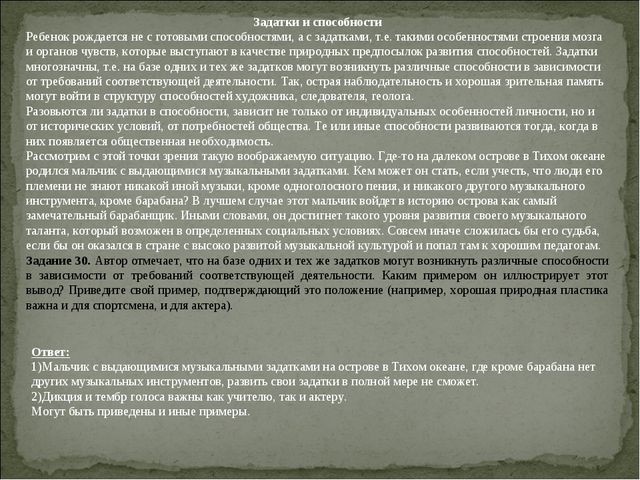
![]()

24 1
Description of the presentation on individual slides:
slide number 1
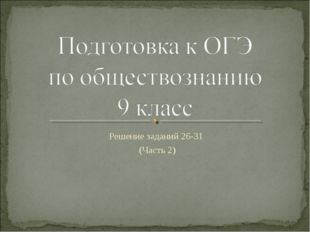
Description of the slide:
slide number 2

Description of the slide:
Solving the tasks of part 2 The second part of the examination work includes a social science text and 6 tasks for it. To complete these tasks, you must select necessary information from the text, to reveal (including examples) its individual provisions, to correlate the information of the text with the knowledge gained during the course, to apply the existing knowledge to analyze social situations, to express and justify one's own opinion. The examinee formulates and writes down the answer independently in a detailed form. Part 2 OGE tests in social science, the authors-compilers offer two types of texts for consideration: a text containing a fragment of some normative document(for example, articles of the law); a text containing a fragment of a book or article by an author on a social science topic. Accordingly, depending on which text is given in the text of the OGE, the tasks of part 2 may differ slightly in wording and meaning.
slide number 3
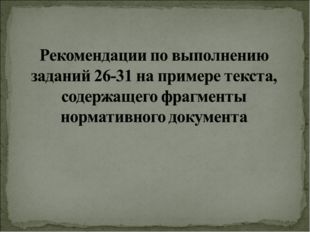
Description of the slide:
slide number 4
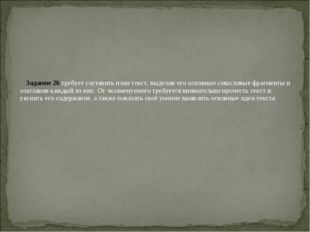
Description of the slide:
Task 26 requires you to plan the text, highlighting its main semantic fragments and title each of them. The examinee is required to carefully read the text and understand its content, as well as show his ability to identify the main ideas of the text.
slide number 5
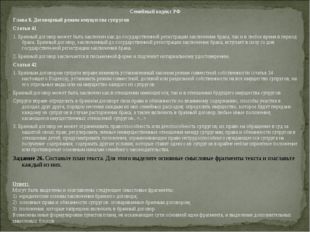
Description of the slide:
<...>3. A marriage contract cannot restrict the legal capacity or legal capacity of the spouses, their right to apply to the court for the protection of their rights; regulate personal non-property relations between spouses, the rights and obligations of spouses in relation to children; provide for provisions restricting the right of a disabled needy spouse to receive maintenance; contain other conditions that put one of the spouses in an extremely unfavorable position or contradict the basic principles of family law. Task 26. Make a plan for the text. To do this, highlight the main semantic fragments of the text and title each of them. Answer: The following semantic fragments can be distinguished and titled: 1) legal basis conclusion of a marriage contract; 2) the basic rights and obligations of spouses. stipulated by the marriage contract; 3) provisions. which are prohibited from being included in the marriage contract. Other formulations of the points of the plan are possible that do not distort the essence of the main idea of the fragment, and the allocation of additional semantic blocks.
slide number 6
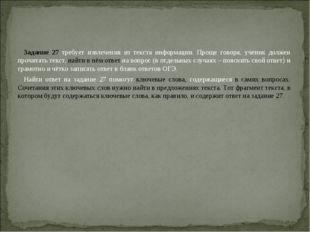
Description of the slide:
Task 27 requires extracting information from the text. Simply put, the student must read the text, find the answer to the question in it (in some cases, explain his answer) and correctly and clearly write down the answer in the OGE answer sheet. Find the answer to task 27 will help keywords contained in the questions themselves. Combinations of these keywords must be found in the sentences of the text. That fragment of the text, which will contain keywords, as a rule, contains the answer to task 27.
slide number 7
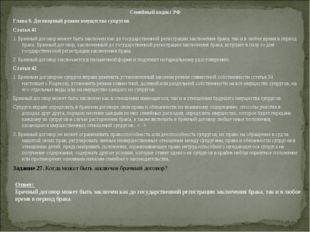
Description of the slide:
Family Code of the Russian Federation Chapter 8. Contractual Regime of Spouses' Property Article 41 1. A marriage contract may be concluded as before state registration marriage, and at any time during the marriage. A marriage contract concluded before the state registration of the conclusion of marriage shall enter into force on the day of the state registration of the conclusion of marriage. 2. The marriage contract is concluded in writing and must be notarized. Article 42 1. Spouses have the right to change statutory regime of joint ownership (Article 34 of this Code), to establish a regime of joint, shared or separate ownership of all property of the spouses, on its certain types or property of each spouse. A marriage contract can be concluded both in relation to the existing and in relation to the future property of the spouses. Spouses have the right to determine in the marriage contract their rights and obligations for mutual maintenance, ways of participating in each other's income, the procedure for each of them to bear family expenses; determine the property that will be transferred to each of the spouses in the event of divorce, as well as include in the marriage contract any other provisions relating to the property relations of the spouses ...<...>3. A marriage contract cannot restrict the legal capacity or legal capacity of the spouses, their right to apply to the court for the protection of their rights; regulate personal non-property relations between spouses, the rights and obligations of spouses in relation to children; provide for provisions restricting the right of a disabled needy spouse to receive maintenance; contain other conditions that put one of the spouses in an extremely unfavorable position or contradict the basic principles of family law. Task 27. When can a marriage contract be concluded? Answer: A marriage contract can be concluded both before the state registration of marriage, and at any time during the marriage.
slide number 8
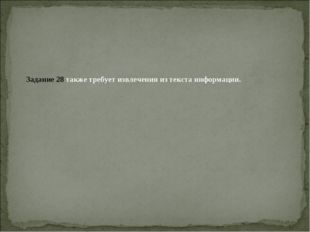
Description of the slide:
slide number 9
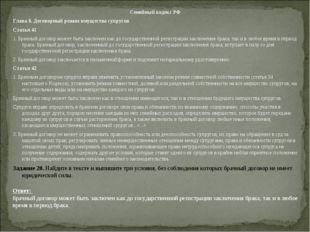
Description of the slide:
Family Code of the Russian Federation Chapter 8. Contractual Regime of Spouses' Property Article 41 1. A marriage contract may be concluded both before the state registration of marriage, and at any time during the marriage. A marriage contract concluded before the state registration of marriage shall enter into force on the day of state registration of marriage. 2. A marriage contract is concluded in writing and is subject to notarization. Article 42 1. By a marriage contract, the spouses have the right to change the statutory regime of joint ownership (Article 34 of this Code), to establish the regime of joint, shared or separate ownership of all the property of the spouses, of its separate types or of the property of each of the spouses. A marriage contract can be concluded both in relation to the existing and in relation to the future property of the spouses. Spouses have the right to determine in the marriage contract their rights and obligations for mutual maintenance, ways of participating in each other's income, the procedure for each of them to bear family expenses; determine the property that will be transferred to each of the spouses in the event of divorce, as well as include in the marriage contract any other provisions relating to the property relations of the spouses ...<...>3. A marriage contract cannot restrict the legal capacity or legal capacity of the spouses, their right to apply to the court for the protection of their rights; regulate personal non-property relations between spouses, the rights and obligations of spouses in relation to children; provide for provisions restricting the right of a disabled needy spouse to receive maintenance; contain other conditions that put one of the spouses in an extremely unfavorable position or contradict the basic principles of family law. Task 28. Find in the text and write down three conditions, without which the marriage contract does not have legal force. Answer: a marriage contract can be concluded both before the state registration of marriage, and at any time during the marriage.
slide number 11
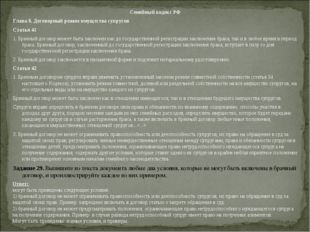
Description of the slide:
Family Code of the Russian Federation Chapter 8. Contractual Regime of Spouses' Property Article 41 1. A marriage contract may be concluded both before the state registration of marriage, and at any time during the marriage. A marriage contract concluded before the state registration of marriage shall enter into force on the day of state registration of marriage. 2. A marriage contract is concluded in writing and is subject to notarization. Article 42 1. By a marriage contract, the spouses have the right to change the statutory regime of joint ownership (Article 34 of this Code), to establish the regime of joint, shared or separate ownership of all the property of the spouses, of its separate types or of the property of each of the spouses. A marriage contract can be concluded both in relation to the existing and in relation to the future property of the spouses. Spouses have the right to determine in the marriage contract their rights and obligations for mutual maintenance, ways of participating in each other's income, the procedure for each of them to bear family expenses; determine the property that will be transferred to each of the spouses in the event of divorce, as well as include in the marriage contract any other provisions relating to the property relations of the spouses ...<...>3. A marriage contract cannot restrict the legal capacity or legal capacity of the spouses, their right to apply to the court for the protection of their rights; regulate personal non-property relations between spouses, the rights and obligations of spouses in relation to children; provide for provisions restricting the right of a disabled needy spouse to receive maintenance; contain other conditions that put one of the spouses in an extremely unfavorable position or contradict the basic principles of family law. Task 29. Write out from the text of the document any two conditions that cannot be included in the marriage contract, and illustrate each of them with an example. Answer: the following conditions can be given: 1) the marriage contract cannot restrict the legal capacity or legal capacity of the spouses, their right to apply to the court for the protection of their rights. Example: it is forbidden to include in the contract an article on the prohibition of going to court. 2) the marriage contract may not include provisions restricting the right of a disabled needy spouse to receive maintenance. Example: in the event of a divorce, a disabled spouse is entitled to alimony. Can be given: and other conditions, and examples.
slide number 12
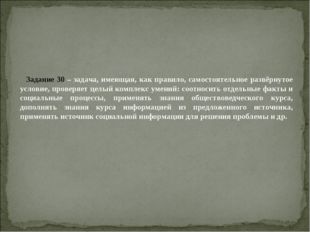
Description of the slide:
Task 30 - a task that, as a rule, has an independent detailed condition, tests a whole range of skills: correlate individual facts and social processes, apply the knowledge of the social science course, supplement the knowledge of the course with information from the proposed source, apply the source of social information to solve the problem, etc.
slide number 13

Description of the slide:
Family Code of the Russian Federation Chapter 8. Contractual Regime of Spouses' Property Article 41 1. A marriage contract may be concluded both before the state registration of marriage, and at any time during the marriage. A marriage contract concluded before the state registration of marriage shall enter into force on the day of state registration of marriage. 2. A marriage contract is concluded in writing and is subject to notarization. Article 42 1. By a marriage contract, the spouses have the right to change the statutory regime of joint ownership (Article 34 of this Code), to establish the regime of joint, shared or separate ownership of all the property of the spouses, of its separate types or of the property of each of the spouses. A marriage contract can be concluded both in relation to the existing and in relation to the future property of the spouses. Spouses have the right to determine in the marriage contract their rights and obligations for mutual maintenance, ways of participating in each other's income, the procedure for each of them to bear family expenses; determine the property that will be transferred to each of the spouses in the event of divorce, as well as include in the marriage contract any other provisions relating to the property relations of the spouses ...<...>3. A marriage contract cannot restrict the legal capacity or legal capacity of the spouses, their right to apply to the court for the protection of their rights; regulate personal non-property relations between spouses, the rights and obligations of spouses in relation to children; provide for provisions restricting the right of a disabled needy spouse to receive maintenance; contain other conditions that put one of the spouses in an extremely unfavorable position or contradict the basic principles of family law. Task 30. When discussing the terms of the marriage contract, a dispute arose. One side argued that it was necessary to include all the property of the spouses in the contract, the other side argued that only part of the property could be stipulated. How do you think this dispute can be resolved? Provide a piece of text that helps answer this question. Answer: 1) when signing the contract, the spouses must come to a mutual agreement, and both options can be included in the contract; 2) quote: “By a marriage contract, the spouses have the right to change the statutory regime of joint ownership (Article 34 of this Code), establish the regime of joint, shared or separate ownership of all the property of the spouses, its separate types or the property of each of the spouses.”
slide number 14

Description of the slide:
Task 31 involves the formulation and argumentation by the graduate of his own judgment on the actual problematic issue of public life. This task is directly related to the content of the text, but it encourages the graduate to consider the text from a different perspective. In such a task, there cannot be a single correct answer - agreement or disagreement with the point of view given in the task is correct. The object of assessment here is the arguments given by students - their clarity, logic, reliance on social science knowledge and the content of the text.
slide number 15
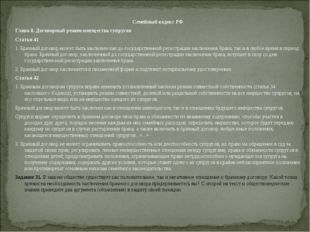
Description of the slide:
Family Code of the Russian Federation Chapter 8. Contractual Regime of Spouses' Property Article 41 1. A marriage contract may be concluded both before the state registration of marriage, and at any time during the marriage. A marriage contract concluded before the state registration of marriage shall enter into force on the day of state registration of marriage. 2. A marriage contract is concluded in writing and is subject to notarization. Article 42 1. By a marriage contract, the spouses have the right to change the statutory regime of joint ownership (Article 34 of this Code), to establish the regime of joint, shared or separate ownership of all the property of the spouses, of its separate types or of the property of each of the spouses. A marriage contract can be concluded both in relation to the existing and in relation to the future property of the spouses. Spouses have the right to determine in the marriage contract their rights and obligations for mutual maintenance, ways of participating in each other's income, the procedure for each of them to bear family expenses; determine the property that will be transferred to each of the spouses in the event of divorce, as well as include in the marriage contract any other provisions relating to the property relations of the spouses ...<...>3. A marriage contract cannot restrict the legal capacity or legal capacity of the spouses, their right to apply to the court for the protection of their rights; regulate personal non-property relations between spouses, the rights and obligations of spouses in relation to children; provide for provisions restricting the right of a disabled needy spouse to receive maintenance; contain other conditions that put one of the spouses in an extremely unfavorable position or contradict the basic principles of family law. Task 31. In our society, there are both positive and negative attitude to the marriage contract. What is your point of view on the need to conclude a marriage contract? Based on the text and social science knowledge, give two arguments (explanations) in defense of your position.
slide number 16
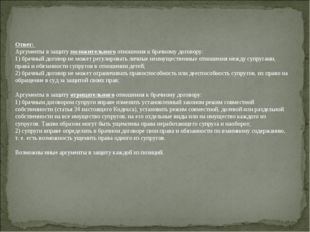
Description of the slide:
Answer: Arguments in defense positive attitude to a marriage contract: 1) a marriage contract cannot regulate personal non-property relations between spouses, the rights and obligations of spouses in relation to children; 2) the marriage contract cannot restrict the legal capacity or legal capacity of the spouses, their right to apply to the court for the protection of their rights; Arguments in defense negative attitude to the marriage contract: 1) by the marriage contract, the spouses have the right to change the statutory regime of joint ownership (Article 34 of this Code), to establish the regime of joint, shared or separate ownership of all the property of the spouses, its separate types or the property of each of the spouses. Thus, the rights of a non-working spouse may be infringed and vice versa; 2) the spouses have the right to determine in the marriage contract their rights and obligations for mutual maintenance, that is, it is possible to infringe on the rights of one of the spouses. Other arguments are possible in defense of each of the positions.
slide number 17
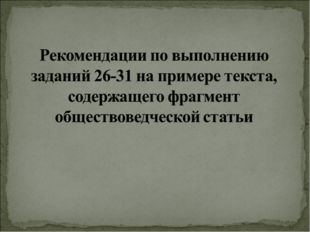
Description of the slide:
slide number 18
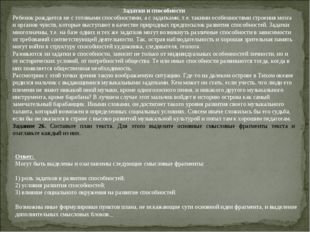
Description of the slide:
Inclinations and abilities A child is not born with ready-made abilities, but with inclinations, i.e. such features of the structure of the brain and sensory organs, which act as natural prerequisites for the development of abilities. The makings are multivalued, i.e. on the basis of the same inclinations, different abilities may arise depending on the requirements of the corresponding activity. So, keen observation and good visual memory can enter into the structure of the abilities of an artist, investigator, geologist. Whether the inclinations develop into abilities depends not only on individual features personality, but also historical conditions from the needs of society. These or other abilities develop when there is a social need for them. Consider from this point of view such an imaginary situation. Somewhere on a distant island in the Pacific Ocean, a boy with outstanding musical inclinations was born. What can he become, given that the people of his tribe do not know any other music than monophonic singing, and no other musical instrument other than the drum? AT best case this boy will go down in the history of the island as the most wonderful drummer. In other words, he will reach such a level of development of his musical talent that is possible in certain social conditions. His fate would have been completely different if he had ended up in a country with a highly developed musical culture and got there to good teachers. Task 26. Make a plan for the text. To do this, highlight the main semantic fragments of the text and title each of them. Answer: The following semantic fragments can be singled out and titled: 1) the role of inclinations in the development of abilities; 2) conditions for the development of abilities; 3) influence social environment for the development of abilities. Other formulations of the points of the plan are possible that do not distort the essence of the main idea of the fragment, and the allocation of additional semantic blocks.
slide number 19
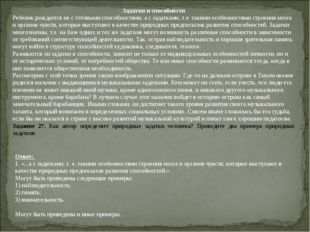
Description of the slide:
Inclinations and abilities A child is not born with ready-made abilities, but with inclinations, i.e. such features of the structure of the brain and sensory organs, which act as natural prerequisites for the development of abilities. The makings are multivalued, i.e. on the basis of the same inclinations, different abilities may arise depending on the requirements of the corresponding activity. So, acute observation and good visual memory can enter the structure of the abilities of an artist, investigator, geologist. Whether the inclinations develop into abilities depends not only on the individual characteristics of the individual, but also on historical conditions, on the needs of society. These or other abilities develop when there is a social need for them. Consider from this point of view such an imaginary situation. Somewhere on a distant island in the Pacific Ocean, a boy with outstanding musical inclinations was born. What can he become, given that the people of his tribe do not know any other music than monophonic singing, and no other musical instrument except the drum? At best, this boy will go down in the history of the island as the most wonderful drummer. In other words, he will reach such a level of development of his musical talent that is possible under certain social conditions. His fate would have been completely different if he had ended up in a country with a highly developed musical culture and got there to good teachers. Task 27. How does the author define the natural inclinations of a person? Give two examples of natural inclinations. Answer: 1. "...but with inclinations, i.e. such features of the structure of the brain and sensory organs that act as natural prerequisites for the development of abilities." Can be given following examples: 1) observation; 2) memory; 3) mindfulness. Other examples may be given.
slide number 20
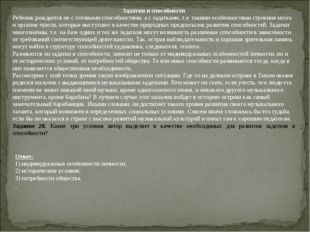
Description of the slide:
Inclinations and abilities A child is not born with ready-made abilities, but with inclinations, i.e. such features of the structure of the brain and sensory organs, which act as natural prerequisites for the development of abilities. The makings are multivalued, i.e. on the basis of the same inclinations, different abilities may arise depending on the requirements of the corresponding activity. So, acute observation and good visual memory can enter the structure of the abilities of an artist, investigator, geologist. Whether the inclinations develop into abilities depends not only on the individual characteristics of the individual, but also on historical conditions, on the needs of society. These or other abilities develop when there is a social need for them. Consider from this point of view such an imaginary situation. Somewhere on a distant island in the Pacific Ocean, a boy with outstanding musical inclinations was born. What can he become, given that the people of his tribe do not know any other music than monophonic singing, and no other musical instrument except the drum? At best, this boy will go down in the history of the island as the most wonderful drummer. In other words, he will reach such a level of development of his musical talent that is possible under certain social conditions. His fate would have been completely different if he had ended up in a country with a highly developed musical culture and got there to good teachers. Task 28. What three conditions does the author identify as necessary for the development of inclinations in ability? Answer: 1) individual personality traits; 2) historical conditions; 3) the needs of society.
slide number 21
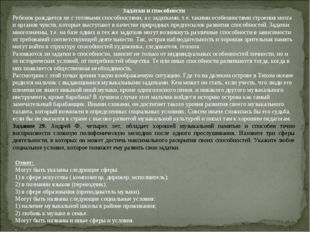
Description of the slide:
Inclinations and abilities A child is not born with ready-made abilities, but with inclinations, i.e. such features of the structure of the brain and sensory organs, which act as natural prerequisites for the development of abilities. The makings are multivalued, i.e. on the basis of the same inclinations, different abilities may arise depending on the requirements of the corresponding activity. So, acute observation and good visual memory can enter the structure of the abilities of an artist, investigator, geologist. Whether the inclinations develop into abilities depends not only on the individual characteristics of the individual, but also on historical conditions, on the needs of society. These or other abilities develop when there is a social need for them. Consider from this point of view such an imaginary situation. Somewhere on a distant island in the Pacific Ocean, a boy with outstanding musical inclinations was born. What can he become, given that the people of his tribe do not know any other music than monophonic singing, and no other musical instrument except the drum? At best, this boy will go down in the history of the island as the most wonderful drummer. In other words, he will reach such a level of development of his musical talent that is possible under certain social conditions. His fate would have been completely different if he had ended up in a country with a highly developed musical culture and got there to good teachers. Task 29. Andrei F., four years old, has a good musical memory and is able to accurately reproduce a complex polyphonic melody after one listening. Name three areas of activity in which he can reach the maximum disclosure of his abilities. Point out any social condition that will help him develop his inclinations. Answer: The following areas can be indicated: 1) in the field of art (composer, conductor, performer); 2) in the knowledge of languages (translator); 3) in the field of education (music teacher). The following social conditions can be named: 1) the presence music school in the area of residence; 2) love for music in the family. Other areas and conditions may also be named.
slide number 22

Description of the slide:
Inclinations and abilities A child is not born with ready-made abilities, but with inclinations, i.e. such features of the structure of the brain and sensory organs, which act as natural prerequisites for the development of abilities. The makings are multivalued, i.e. on the basis of the same inclinations, different abilities may arise depending on the requirements of the corresponding activity. So, acute observation and good visual memory can enter the structure of the abilities of an artist, investigator, geologist. Whether the inclinations develop into abilities depends not only on the individual characteristics of the individual, but also on historical conditions, on the needs of society. These or other abilities develop when there is a social need for them. Consider from this point of view such an imaginary situation. Somewhere on a distant island in the Pacific Ocean, a boy with outstanding musical inclinations was born. What can he become, given that the people of his tribe do not know any other music than monophonic singing, and no other musical instrument except the drum? At best, this boy will go down in the history of the island as the most wonderful drummer. In other words, he will reach such a level of development of his musical talent that is possible under certain social conditions. His fate would have been completely different if he had ended up in a country with a highly developed musical culture and got there to good teachers. Task 30. The author notes that on the basis of the same inclinations, different abilities may arise depending on the requirements of the relevant activity. How does he illustrate this conclusion? Give your own example confirming this position (for example, good natural plasticity is important for both an athlete and an actor). Answer: A boy with outstanding musical inclinations on an island in the Pacific Ocean, where there are no other musical instruments besides the drum, will not be able to fully develop his inclinations. Diction and timbre of the voice are important for both the teacher and the actor. Other examples may be given.
slide number 23
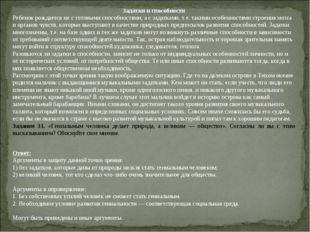
Description of the slide:
Inclinations and abilities A child is not born with ready-made abilities, but with inclinations, i.e. such features of the structure of the brain and sensory organs, which act as natural prerequisites for the development of abilities. The makings are multivalued, i.e. on the basis of the same inclinations, different abilities may arise depending on the requirements of the corresponding activity. So, acute observation and good visual memory can enter the structure of the abilities of an artist, investigator, geologist. Whether the inclinations develop into abilities depends not only on the individual characteristics of the individual, but also on historical conditions, on the needs of society. These or other abilities develop when there is a social need for them. Consider from this point of view such an imaginary situation. Somewhere on a distant island in the Pacific Ocean, a boy with outstanding musical inclinations was born. What can he become, given that the people of his tribe do not know any other music than monophonic singing, and no other musical instrument except the drum? At best, this boy will go down in the history of the island as the most wonderful drummer. In other words, he will reach such a level of development of his musical talent that is possible under certain social conditions. His fate would have been completely different if he had ended up in a country with a highly developed musical culture and got there to good teachers. Task 31. "Nature makes a man brilliant, and society makes him great." Do you agree with this statement? Justify your opinion. Answer: Arguments in defense of this point of view: 1) without the inclinations that are given by nature, one cannot become brilliant man; 2) great person someone who has done something very significant for society. Arguments in refutation: 1. A person cannot become a genius without his own efforts. 2. Necessary condition development of genius - the appropriate social environment. Other arguments may also be given.
